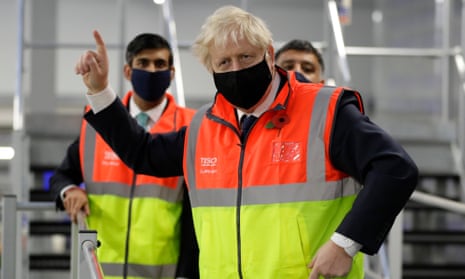We can see the U-turn coming, the tyres burning, the wheels screaming. The government will surely sooner or later decide to continue the £20-a-week uplift in universal benefits until the crisis ends. So why not do it now? Boris Johnson today ordered his MPs to abstain on a Labour motion demanding the uplift stays beyond March. He derided it as coming from the same “army of Momentum trolls” who stampeded him into a U-turn on school meals last year. So why set himself up for another humiliation?
Britain’s poorest are plainly the hardest hit by the government’s pandemic policy. When the benefits uplift of £1,000 a year was introduced by Rishi Sunak last spring, few could then have known it would be needed this long. As a prospective rebel Tory MP, John Stevenson, says: “I understand that the government cannot commit to making it permanent … [but it should] continue it for the foreseeable future. That allows us to get a better understanding of where we are.”
The Treasury has been generous in the extreme to businesses, though the bigger the better. Hardly a month goes by without extended furlough payments, VAT relief, rates relief, interest-free loans and massive quantitative easing – in effect, subsidies to banks. Only this month Sunak gave grants of up to £9,000 each to some 600,000 cash-strapped firms. Meanwhile, he has been unbelievably casual as the government has approved multimillion-pound contracts to ministers’ friends and allies, as they cluster like bees round the honey pot.
When it comes to giving money directly to the poor, the coffer is suddenly bare. This is in stark contrast to other countries where direct payments are part of the repertoire. In the US most Americans last March got $1,200 from the federal government plus there was a $600-a-week top-up to unemployment benefit; and Congress passed a stimulus package that includes a massive $250bn in direct payments. Similar payments to individual “freelancers” have been doled out in Germany, France, Italy, the Netherlands, Malaysia and Australia, among others.
British governments seem to regard giving poor people such “helicopter” money as somehow vulgar and distasteful. Aid should be sanitised through a bank or business account, which inevitably excludes the most needy. This week the Resolution Foundation reported that poverty in the UK is set to rise sharply among the 6 million people on benefits, with a rise of 730,000 cases of child poverty. This comes on top of rises in child mental-health illness, domestic abuse and educational deprivation. This is not the fault of individuals or of the pandemic itself. It results from the government’s chosen form of lockdown, savaging the lowest-paid tiers of the private sector and slashing local social support services. In rebutting his party critics, Johnson last week told MPs that “most people would rather see a focus on jobs and a growth in wages than … welfare”. Who is most people? It is he who decided to destroy jobs. Until he shows he can restore them, the least he can do is help those most hurt by that decision.
Simon Jenkins is a Guardian columnist

